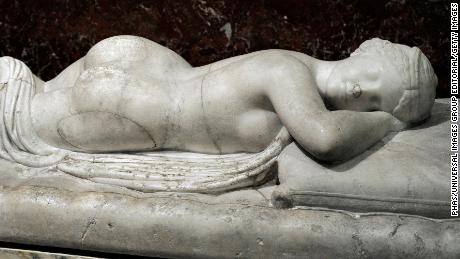The hymen's a myth and virginity's a construct. It's time to let both go
Updated 1604 GMT (0004 HKT) January 28, 2022
This story is part of As Equals, CNN's ongoing series on gender inequality. For information about how the series is funded and more, check out our FAQs.
(CNN)On Monday, the British government moved to make hymenoplasty, or "virginity repair" surgery -- with or without consent -- illegal.
The move, a further amendment to the Health and Care Bill, comes hot on the heels of another change to the bill introduced in November 2021 and intended to make "virginity testing" in England and Wales a criminal offense.
Both virginity testing and virginity surgery are prevalent in conservative cultures, and were described by Dr. Edward Morris, president of the UK Royal College of Obstetricians and Gynecologists, as being "inextricably linked forms of violence against women and girls."
Given the harms described by victims of both practices, these UK legislative changes are welcome, but if anything, they should be seen as a beginning and not an end. It is not just testing and repair that is harmful. The very concept of "virginity" is. And it's one societal construct that continues to have extraordinary power in so-called conservative and liberal cultures alike.
While not universally the case, in a gender-binary, heteronormative world in which a girl's value is intrinsically less than that of a boy, her virginity becomes a commodity she trades -- or that is traded for her -- in exchange for better societal prospects. Most obviously, this means improving the chances of a "good marriage," but not exclusively. Virginity has also, for example, been a condition for academic progression, as with the ill-conceived proposal for "maiden bursaries" in South Africa: a scheme that offered university scholarships to young women on the condition they remained virgins.
The hymen -- and its structural integrity -- is the cornerstone of purity cultures, yet as Irish journalist Lynn Enright explains in an extract from her book Vagina: A Re-Education, "it's pretty obvious that there is a disconnect between the imagined hymen and the real, biological hymen ... The hymen is not a tautly pulled skin protecting a girl's vagina. It is a 'thin fold of mucous membrane situated at the orifice of the vagina'."
Despite the fact that the hymen as it is conceived is more mythical than real, the desire to preserve or prove one's virginity has also created pressure for young women to have anal sex in the first instance and penetrative vaginal sex in the second.
Like most other harmful patriarchal norms, the idea of virginity does boys no favors either. Hyper-masculinity -- the pressure to be a man's man -- presents male virginity as a failure, while at the same time female virginity is to be prized.
What's more, virginity, as it's widely understood, provides a limited definition of what sex itself is, since losing one's virginity requires a penis to penetrate a vagina. Aside from the fact that sex between queer people often falls outside this definition, research has also shown that such a narrow understanding of sex puts adolescents at risk of sexual abuse that they won't recognize as such -- because it might not have involved penile-vaginal intercourse.
So, the point is this: virginity is simply a phase, little different from having baby teeth. For most people, this phase will be one they transition from. However, when virginity is seen as some kind of identity -- with the capacity to illicit shame or to control -- young women will find themselves exposed to violence either at the hand of their peers or of their own families.
Still, any move to criminalize both virginity testing and "repair" is a welcome one. As the World Health Organization said unequivocally: "The harmful practice of virginity testing is a social, cultural and political issue, and its elimination will require a comprehensive societal response."
That comprehensive societal response is arguably not going to be possible without first letting go of the significance attached to the concept of virginity itself.
Story of the week
Skin whitening is the use of cosmetic products or services to reduce the amount of melanin, or pigment, in the skin to make it appear lighter. It is a big industry and targets women of color in every region of the world, with the Asia-Pacific Region being the most lucrative. Find out more about the global skin whitening market, the culture of colorism promoting it, the industry behind these products and the effect they can have on your health.
Women behaving badly: The Lijadu Sisters
Written by Adie Vanessa Offiong
The Lijadu Sisters -- Taiwo and Kehinde Lijadu -- were identical twins and one of Nigeria's most popular musical acts from the late 60s to the 80s. They made waves in the 70s at a time when it was rare for women to hold such a place in the country's music scene.
The sisters started their career as backup singers before eventually releasing their first song, Iya Mi Jowo in 1969. In 1971, they met "rock's first superstar drummer" Ginger Baker and performed with his band Salt at the 1972 Munich Olympic Games.
Sometimes described in western media as West Africa's Pointer Sisters, with their blend of funk and afrobeat, the Lijadu Sisters made music condemning injustice and encouraging hope.
After the 80s, they fell into obscurity before in the past couple of decades new audiences have been celebrating their lives and discovering their music -- though without always giving them their due credit. In 2006, US rapper Nas sampled their song for his own record and gave it the same name, without crediting the sisters.
Born in northern Nigeria on October 22, 1948, Taiwo and Kehinde grew up in Ibadan. After moving around Nigeria, they relocated to New York in the 80s. The sisters are related to the late afrobeat legend, Fela Kuti, and to Nobel Laureate, Wole Soyinka.
Kehinde died from cancer on November 9, 2019.
Other stories worth your time
The art of gender fluidity: 9 works that show how sexual Identity has evolved over art history -- Art Space
How harassment keeps women politicians offline in Uganda -- Rest of World







